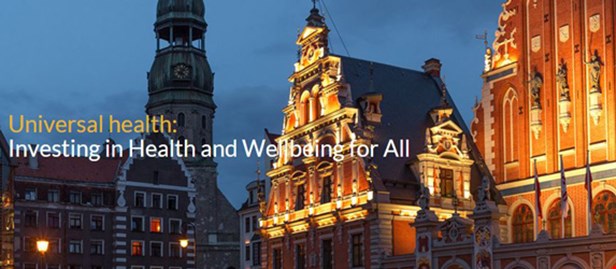June 2015
 © Latvian Presidency of the Council of the European Union
© Latvian Presidency of the Council of the European Union
A ROADMAP TO SUSTAINABLE, EQUITABLE AND PARTICIPATORY EU HEALTH SYSTEMS
At the end of June 2015, EPF co-organised a high-level conferenceunder the Latvian Presidency titled “Universal health: Investing in Health and Wellbeing for All”. A major outcome of the event was the “Riga roadmap” that calls on EU and national policymakers to develop health systems that embed the principles of prevention, promotion, protection and – importantly – participation.
Our partners to this conference were three major health organisations: the European Public Health Alliance (EPHA), the European Generic and Biosimilar medicines Association (EGA) and the European Federation of Pharmaceutical Industries and Associations (EFPIA).
The event developed further the priority areas identified in the Vilnius declaration (2013) under the Lithuanian Presidency and called for concrete actions in investing more in cost-effective health promotion and disease prevention. This includes ensuring universal access to high-quality, people-centred health services and ensuring the values of solidarity and equity are preserved in discussions around cost effectiveness and sustainability.
Several speakers from EPF attended the event, including Anders Olauson, EPF President; Stanimir Hasurdjiev, EPF board member; and Gunta Anca, from our Latvian member organisation SUSTENTO.
The “Riga roadmap”, a significant outcome of the event, was adopted jointly by the four organisers and published in August.
As Anders Olauson, EPF President, said: “To deliver high-quality care that is equitable and sustainable, health systems need to shift from a disease-centred to a person-centred approach, where self-management, community and specialist medical care and social care are integrated in personalised solutions centred on the needs of patients. This implies changes at all levels in how care is structured and delivered, and it implies the full participation of patients – not only in their own care, but also in policy-making, in co-designing services, and in research to develop new therapies that meet patients’ needs more effectively. EPF and our member patient organisations across the EU are committed to playing our part in driving this transformation.”
The key recommendations from the Roadmap will inform our policy work next year under the Dutch and Slovakian EU Presidencies, in close co-ordination with the Patient Access Partnership (PACT).
You can find the presentations from the Riga conference here and watch videos from the event here.
Contact: EPF Director of Policy, Kaisa Immonen-Charalambous, kaisa.immonen-charalambous@eu-patient.eu
